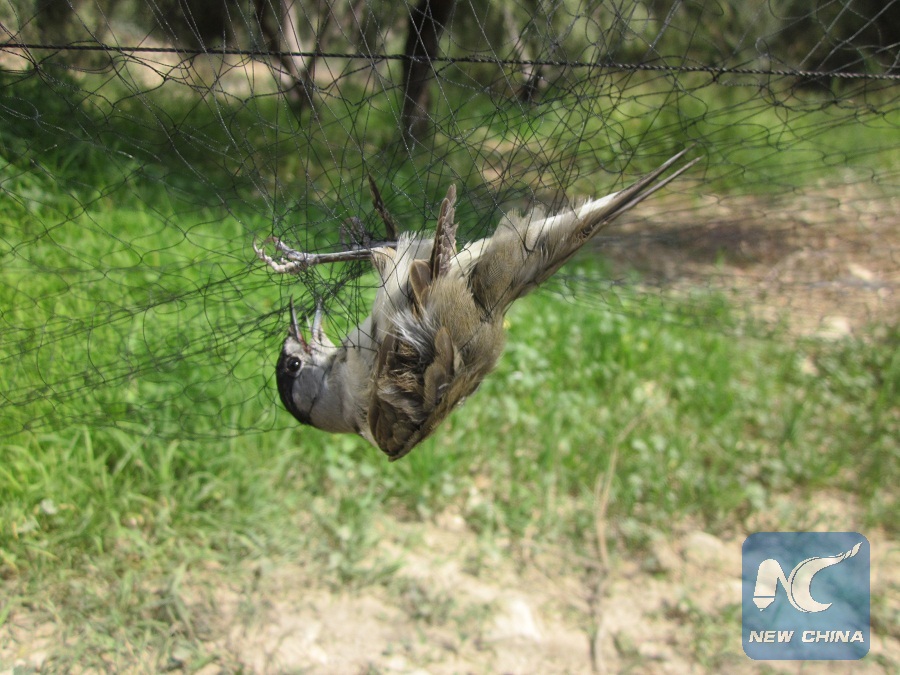
Photo provided to Xinhua by Birdlife Cyprus shows a trapped bird.
NICOSIA, March 18 (Xinhua) -- With an estimated 2.3 million birds were killed in Cyprus last autumn, urgent and strict actions must be taken to stem the practice, the wildlife organization Birdlife Cyprus said on Friday.
"Bird trapping by poachers in Cyprus is still widespread despite a clampdown by authorities. Our surveys show that an estimated 2.3 million birds were killed in the autumn bird-trapping season in 2016," Tassos Shialis, Birdlife Cyprus campaign coordinator told Xinhua in an interview.
He said illegal bird trapping is a serious and persistent problem both on Cyprus soil and the two areas which Britain has maintained under its control as sovereign base territories since it granted independence to the eastern Mediterranean island in 1960.
Bird trapping has been a popular pastime in Cyprus for centuries. People used sticky limesticks to trap songbirds which arrive by millions early in the autumn as they migrate to moderate climates for the winter.
The birds feed on fruit, mostly on grapes and figs, hence their local names of "ambelopoulia", meaning vineyard birds, or "sikallides", meaning fig feeders.
In the old days, bird trapping was a means of complementing the poor village diet, but in recent decades, with the advent of mist nets on which birds are trapped by thousands, it has become a lucrative business with income for poachers estimated at 15 million euros per year.
Cyprus made illegal bird trapping after it joined the European Union in 2004, but despite strong policing by both the Cypriot police and the police of the British Sovereign Base Areas, the practice is still going strong.
Shialis said that 21 km of mist net rides were active during autumn 2016 within the survey area, which covers the Larnaka-Famagusta and the Ayios Theodoros-Maroni areas on the eastern and southern coasts of Cyprus where the songbirds start arriving in August.
He added that in the territory under the control of Cypriot authorities, the use of limesticks is widespread while in the British Base Sovereign Areas (SBAs) there is an extensive mist netting and widespread use of calling devices to draw in birds to their death.
Despite penalties in place for bird trapping and bird consumption in public, there are restaurants which offer ambelopoulia as an expensive delicacy, usually disguised as stuffed vine leaves.
Shialis said that during the months of August to October 2016, more than 850 mist nets were confiscated by authorities, the highest number confiscated in the last six years.
During the same period more than 3,500 limesticks were confiscated by enforcement agencies.
"This wildlife crime is taking place both in Cyprus and the SBAs, making it very clear that a joint effort is necessary to address this persistent issue," Shialis said.
He noted that net misting activity reached a record high within the Dhekelia SBA near the southern airport city of Larnaca.
When SBA authorities sent troops in the region of Cape Pyla last summer to clear the area of vegetation used for bird trapping, the entire population of a nearby village gathered there and encircled the unarmed soldiers for a whole day until the authorities backed down.
Shialis urged the SBA authorities to continue their acacia clearing program this year, warning that a let up will risk losing all the momentum in the bird trapping control program.
Cypriot authorities also had to bow to pressure by the residents of many villages and proposed a series or relaxations in the existing legislation.
"Birdlife Cyprus believes that zero tolerance against illegal bird trapping is called for as a matter of urgency," said Shialis.
A spokesman for Birdlife United Kingdom also urged the British government to take firm action, pointing that the British people care passionately about birds.
But any measures are bound to be ineffective, as trapping is done to a large extent in private properties in which authorities can have access only after a court warrant.

